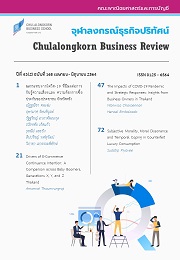Drivers of E-Commerce Continuance Intention: A Comparison across Baby Boomers, Generations X, Y, and Z in Thailand
Main Article Content
Abstract
Globalization of trade and investments coupled with advancements in telecommunication and transportation technology have driven growth in international business, particularly e-commerce. Focusing on business-to-consumer (B2C) e-commerce, this study investigates the drivers of post-COVID-19 pandemic e-commerce continuance intention across baby boomers, Generations X, Y, and Z in Thailand. Self-administered online survey data from 851 Thai respondents obtained after the first lockdown were analyzed using multiple-group structural equation modeling. Results show that perceived risks in e-commerce have the strongest negative effect on trust, followed by utilitarian motivations while hedonic motivations only have marginal effect. From the total sample, utilitarian motivations are the most influential driver for continuance intention while trust has the least impact. Within each generation, although hedonic motivations represent the most important driver among baby boomers, utilitarian motivations are the only significant factor in Generation X, and are the most significant across Generations X, Y, and Z with trust being unimportant to Generations X and Y. Proposed relationships are marginally different between Generations X and Z, but not in other pairwise comparisons.
Article Details
Opinions and discussions in papers published by the Creative Business and Sustainability Journal (CBSJ) are deemed as personal opinions and the responsibility of the writers. They are not the opinions or responsibility of the Chulalongkorn Business School of Chulalongkorn University.
Papers, content, information etc. appearing in the Journal are deemed to be the copyright property of the Chulalongkorn Business School of Chulalongkorn University. Anybody or any organization that wishes to publish any part of them or use them in any way must obtain written permission from the Chulalongkorn Business School, Chulalongkorn University.


